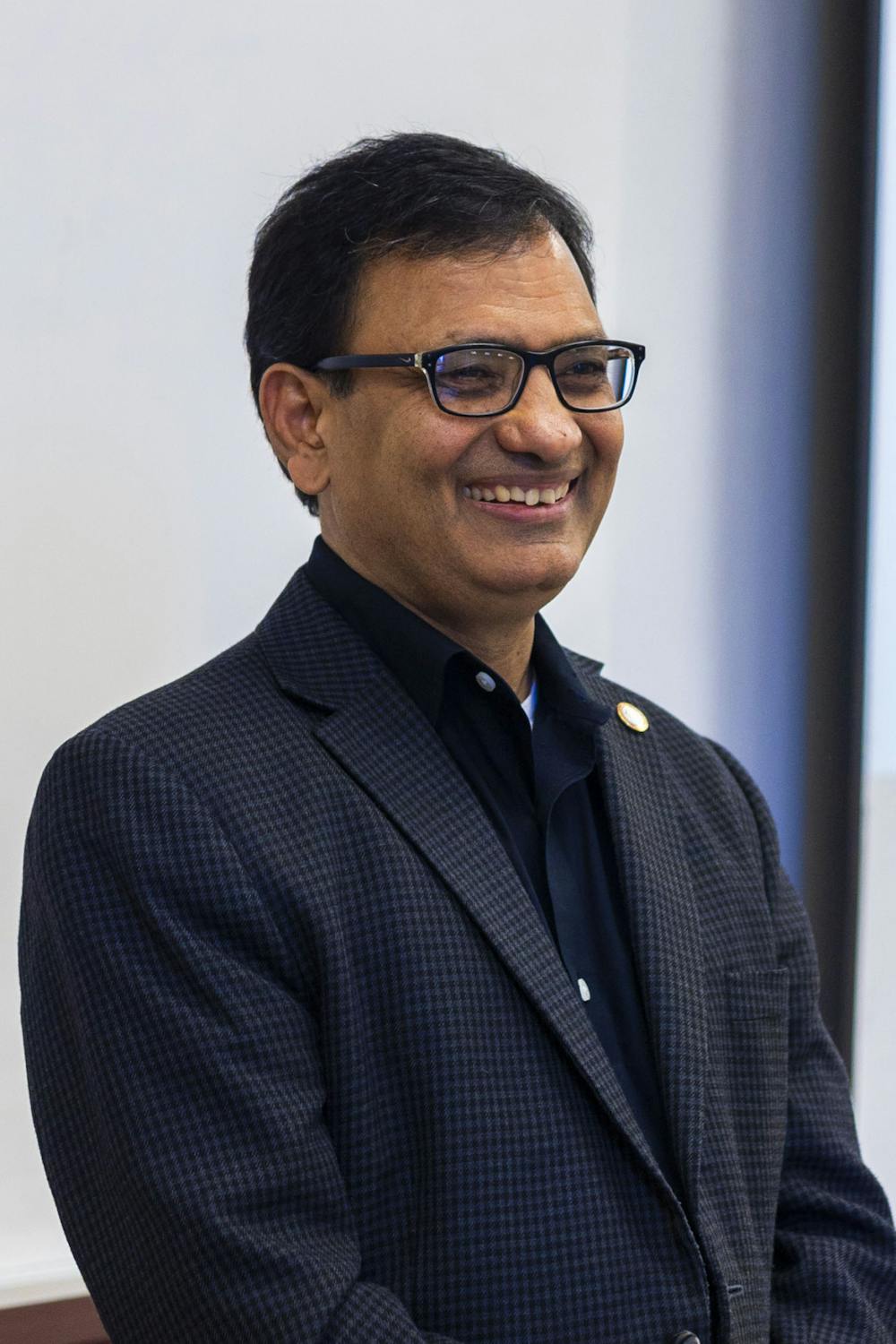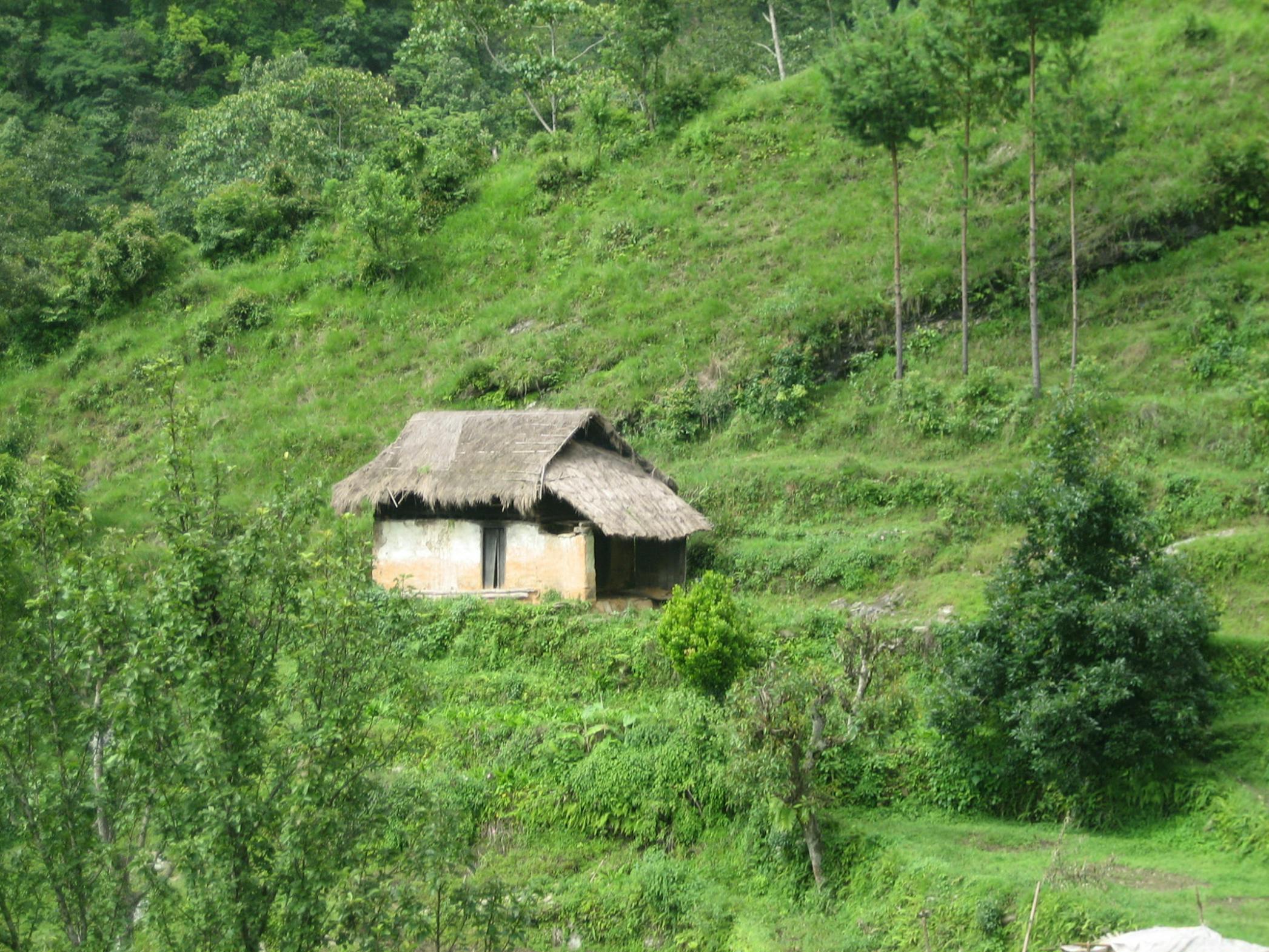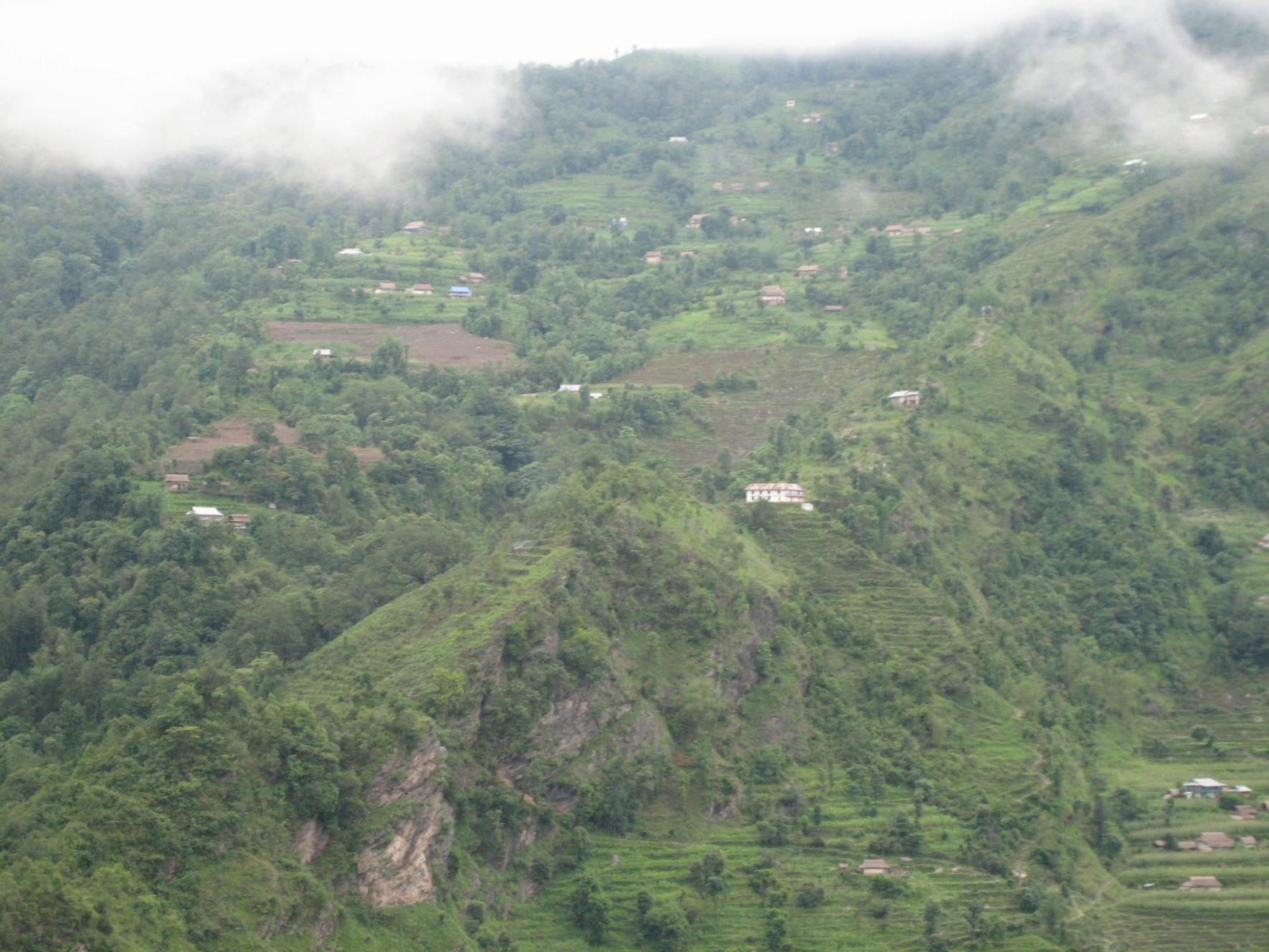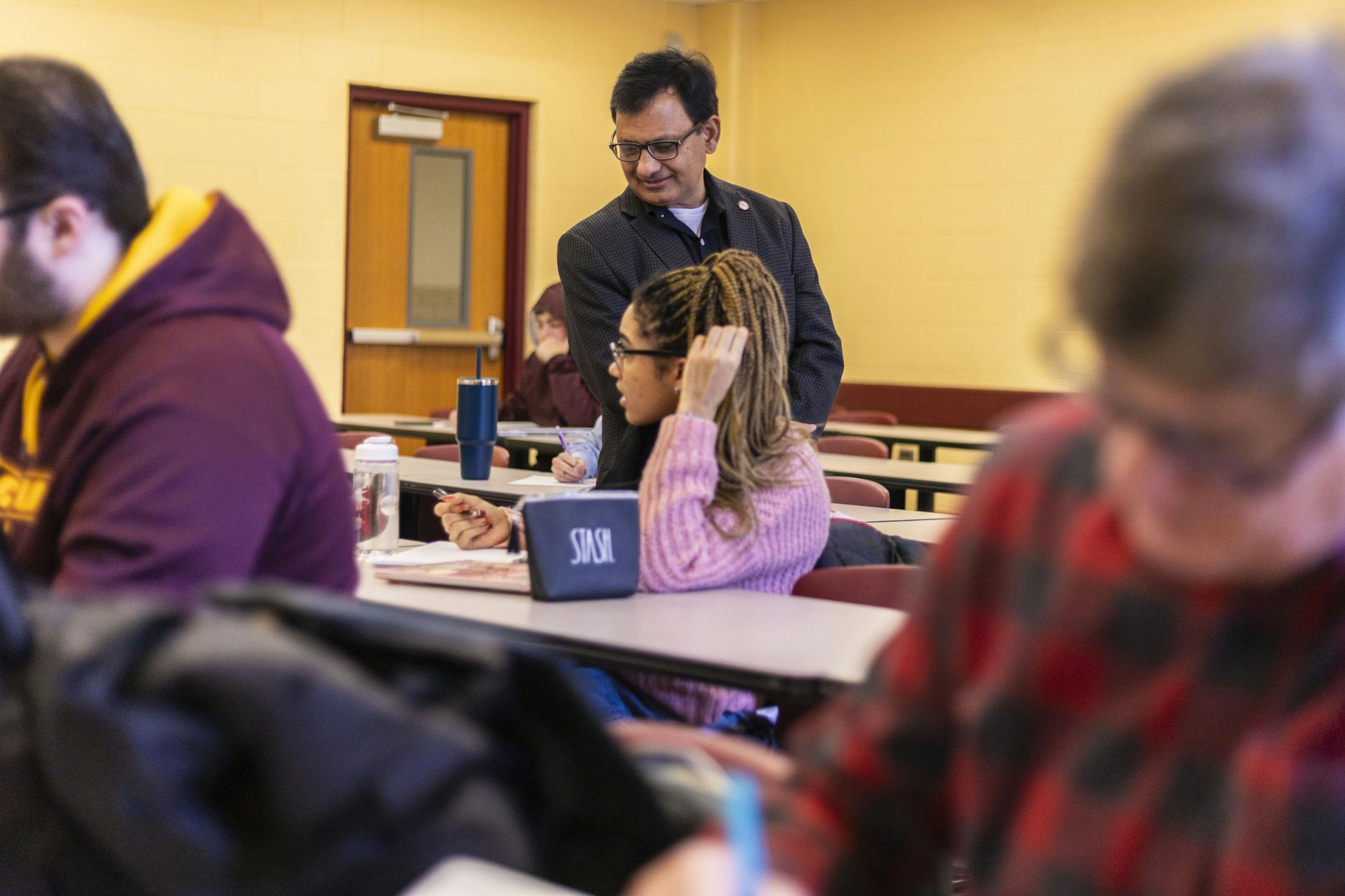A long and winding road
Prof. Prakash Adhikari's journey from South Asia to Central Michigan

Prakash Adhikari as a child fled with his family from east Nepal to Northeast India, hiking through the mountainous terrain for two days and experiencing electricity for the first time.
“When I saw a bus for the first time, I saw a giant animal with a big mouth and really big eyes making some sort of weird noise,” Adhikari said. “I thought it was gonna eat me.”
Adhikari is a professor of political science at Central Michigan University who specializes in teaching international relations. He is also the director of the Institute for Migration and Refugee Studies, advisor for Amnesty International Chapter at CMU, the Refugee Outreach Collective and coordinator for Global Classroom Program.
He received his master's in economics first, but wanted to study and research something with more of a human aspect to it.
“I chose political science primarily because I had a motive to find out more about it,” Adhikari said. “International relations just fascinated me.”
Childhood in Nepal
Adhikari wanted to gain more knowledge on forced migration, civil war and why these events occur. His experience moving from Nepal to India sparked his interest in these topics, he said.
He was born in a small village in East Nepal alongside a river in a valley surrounded by mountains.

“The river originates from the snow melting from the top of the mountains,” Adhikari said. “It is just the most beautiful place.”
Adhikari not only had connections and relationships with his classmates and family in his village but a connection to the environment and nature within it.
“As a kid, we would run across (the village) and climb on rocks and trees and see wild animals like monkeys,” Adhikari said. “But most of all, I miss the mountains.”
Adhikari said that despite these memories, he and his family needed to leave.
“When I was about five or six, we fled to India for two reasons,” Adhikari said. “Lack of economic opportunities and political rights: Nepal did not have them.”
History of Nepal
According to the Government of Nepal and the Ministry of Foreign Affairs, the Shah Dynasty ruled Nepal from 1769 to 2008. In the 19th Century, Jung Bahadur Rana became Nepal’s first prime minister to have absolute power diminishing the Shah king. This started a reign of Rana Prime Ministers that lasted for 104 years.
The Ranas were overthrown in a democracy movement of the early 1950s with support from the then-monarch of Nepal, King Tribhuvan. In 1959, Tribhuvan’s son King Mahendra issued a new constitution; the first democratic elections were held resulting in the Nepali Congress Party being victorious.
By 1960, King Mahendra had changed his mind and dissolved Parliament, dismissing the first democratic government, according to the Ministry of Foreign Affairs.
After years of struggle, that start of the People’s Movement formed in 1990. This paved way for democracy. In May 1991, Nepal held its first parliamentary elections. In February 1996, the Maoist parties declared People’s War against monarchy and the elected government.
Another People's Movement was launched by democratic parties in 2006 resulting in the Comprehensive Peace Agreement (CPA). In May of 2008, Nepal was declared a Federal Democratic Republic, according to the Ministry of Foreign Affairs.
The political condition, the hardship of introducing democracy to the country and the fact that it was not safe there anymore forced Adhikari's family to leave the country, he said.
An outsider in India
Adhikari said he was “super nervous” about making his way to India.
“I started throwing up and I got sick throughout the journey to India,” Adhikari said.
He said they were traveling to Northeast India in a state called Manipur. One of the first challenges Adhikari faced after settling in Manipur was the language.
“So, in Nepal, I was speaking Nepali but when we got to India, they spoke Manipuri, which is totally different from my mother tongue,” Adhikari said.
He said that made the studying at the school hard.
Adhikari said that his family was “surviving” under very bad economic conditions.
“I still remember my parents were struggling to feed us,” Adhikari said. “I think I just wanted to overcome those things, but my refusal to accept the conditions I was in just motivated me even more.”
He often felt like an outcast and didn’t feel safe.
“I was subject to discrimination because of the way I looked,” Adhikari said. “I had to be careful every single day.”
He said he was often called a ‘foreigner’.
Adhikari said that the Manipur was different from the rest of India in terms of religion, culture and language. When India incorporated the state of Manipur even when they didn’t want to be included, it created conflict.

“So, when they see a person who looks like an Indian they call him a foreigner,” he said.
Adhikari said he had fallen victim to hatred and humiliation.
“I’ve been physically abused several times,” Adhikari said. “It was not the most hospitable part of India for foreigners.”
Adhikari had created groups for Nepali students in India to create more inclusivity and community.
“If we all came together as members of an organization, then we have a collective voice, as opposed to one person fighting against this kind of discrimination,” he said.
Education to CMU
After high school in Manipur, Adhikari received his bachelor's degree in economics from Patkai Christian College under North-Eastern Hill University in the state of Nagaland, India, where he started learning English.
He then returned to Nepal in 1991, where he received his master's degree in economics from Tribhuvan University.
Adhikari continued his academic career at the University of New Mexico, where he got his doctoral degree in political science.
He said that he appreciates the support he had throughout graduate school.
“My friendships with my cohort made my transition to grad school and American way of life very easy,” Adhikari said. “I am still in touch with most of them and have co-authored research with more than one of my classmates.”
He shared that his classmates tried to teach him sports.
“They tried to teach me how American football is played but gave up once they found out I was mixing up football with soccer,” Adhikari said.

He also started the Nepali Student Association at the University of New Mexico for those who have similar experiences to him and to create a safe place for others.
“I think education can change people’s life,” Adhikari said. “I love being part of students who are learning and exploring new ways to address challenges facing the world today, such as forced migration and human rights.”
After graduate school, he applied to over 100 jobs with CMU being the only interview he heard back from, starting his position at CMU in 2011.
“My path to citizenship was smooth because of my job and success as a scholar,” Adhikari said.
Since then, he has become involved in several registered student organizations (RSO) on campus, including the Refugee Outreach Collective (ROC), the Amnesty International chapter and the Nepali Student Association.
He said that these organizations are very important to growing and developing as a person by learning how to gain leadership, fundraising and social skills.
Adhikari believed that education can be life-changing, therefore he was part of the creation of the Global Classroom at CMU. He made the program available to people in Malawi so individuals experiencing forced displacement in Dzaleka Refugee Camp, Malawi could continue their academic career and receive a college degree.
This program allows students to connect to one another while networking with organizers in Dzaleka and supports the economy by using resources from the camp that participants are familiar with.
“We want to give them access to college education, and with that, if they get an education they can get out of the refugee camp and start their life,” Adhikari said. “That would be nice.”
Without generalizing ones experience to many people, Adhikari said that his advice to others would be to understand and know what you want to accomplish, learn from your failures and stay motivated.



